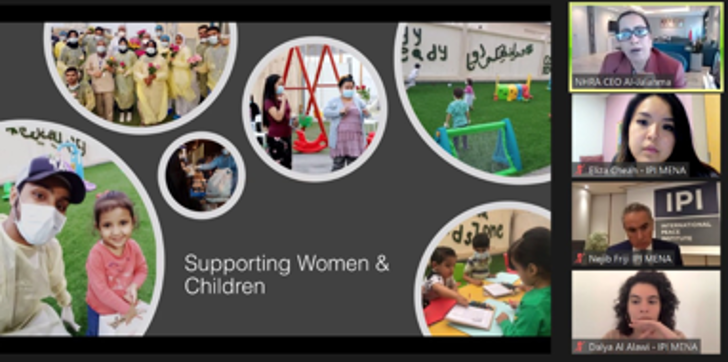
To commemorate the International Day of Women and Girls in Science on 11 February 2022, IPI MENA hosted a webinar on February 17, 2022 entitled “The Role of Gendered Private Sector in Tackling Pandemics” to highlight the fundamental role of women in the MENA region as not only front-liners during the onset of Covid-19 but as a cornerstone in the private sector.
IPI MENA Director Nejib Friji opened the webinar, stating, “Women are at the forefront of all efforts deployed to mitigate the challenges brought by covid-19 and to achieve harmonious regional sustainable development.”
Key speaker H.E Wided Bouchamoui, Former leader of the Tunisian Confederation of Industry, Trade and Handicrafts (UTICA), co-founder of the Tunisian National Socio-economic Dialogue Quartet and Nobel Laureate recipient, emphasized how small-and-medium women-owned businesses were disproportionately hit in the MENA region.
“Women entrepreneurs need to sacrifice more than their male counterparts,” she stressed, largely due to the fact that women are grappling with already existing economic restrictions exacerbated by the pandemic.
Underlining several solutions to address the socio-economic imbalance, she suggested reforming laws towards more inclusive legal frameworks in enhancing women’s rights as well as the removal of systematic barriers in business by investing in training and mentorship of women in non-traditional sectors to facilitate their integration into STEM fields. “We need you men as our partners,” she stressed, noting the necessity and requirement of male counterparts in society to address these issues.
H.E Dr. Mariam Adhbi Al Jalahma, CEO of the National Health Regulatory Authority, Member of the Supreme Council of Health and member of Bahrain’s National Medical Team to combat covid-19, pointed to Bahraini women during her intervention as examples of the key role women can play in national pandemic efforts. “During the pandemic, 400 female nurses were employed immediately to provide care for the covid patients,” she noted. She also stressed the critical role the private sector played in providing facilities for quarantine and services in tackling the challenges of the pandemic.
Professor M. Dahmani Fathallah, former Harvard Medical School scientist and Dean of the College of Graduate Studies at the Arabian Gulf University (AGU) in Bahrain, acted as principal discussant. Emphasizing the importance of both education and technology in fighting gender discrimination, he noted the development of the second-generation vaccine at AGU and stressed its’ success was due to the contribution of its female researchers.
Concluding with a question-and-answer segment, Charge D’Affaires of the US Embassy H.E Margaret Nardi underscored the importance of recognizing the negative impacts of the pandemic on women through the stark rise in domestic violence and unsustainable workloads.
H.E Kai Boeckmann, the German Ambassador to the Kingdom of Bahrain, reiterated H.E Nardi’s comment on the need to work together to find sustainable solutions to these realities and pointed specifically to the impact of the pandemic on climate change and women.







